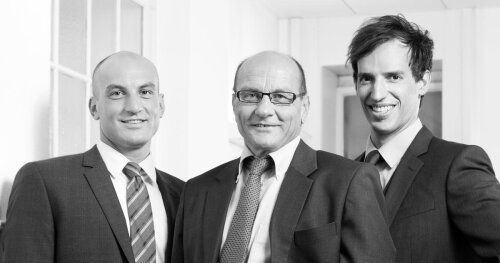Best Defamation Lawyers in Lucerne
Share your needs with us, get contacted by law firms.
Free. Takes 2 min.
List of the best lawyers in Lucerne, Switzerland
About Defamation Law in Lucerne, Switzerland
Defamation law in Lucerne, part of the Swiss legal framework, aims to protect individuals and entities from false statements that harm their reputation. It is governed under the Swiss Civil Code and the Swiss Penal Code. Lucerne, known for its robust legal system, adheres to the national laws of Switzerland, ensuring that any claims of defamation are addressed fairly and justly. In legal terms, defamation can occur through libel (written statements) or slander (spoken words), and anyone affected by such actions can seek remediation through the Swiss courts.
Why You May Need a Lawyer
There are several scenarios where a person might need legal assistance for defamation in Lucerne, including:
- Being falsely accused of a crime or serious misconduct, leading to reputational damage.
- Experiencing negative impacts on personal or professional relationships due to defamatory statements.
- Finding false information published online or in traditional media that tarnishes one's image.
- Having to navigate the complexities of legal procedures and defenses surrounding defamation cases.
- Seeking compensation or a formal retraction of defamatory statements to protect one's reputation.
Local Laws Overview
Defamation in Lucerne falls under Swiss national legislation, which includes provisions for both civil and criminal accountability. Key aspects include:
- Truth in Statements: The truthfulness of a statement is a critical defense in defamation cases.
- Public Interest: Statements deemed to be in the public interest and made without malice stand a chance of being exempt from defamation.
- Privacy Considerations: Individuals have the right to protect their privacy, and any unwarranted intrusion may compound defamation issues.
- Burdens of Proof: The plaintiff must prove harm, falsehood, and reputational damage, while the defendant needs to substantiate claims made.
- Statute of Limitations: Defamation cases must typically be brought within a certain time frame from when the defamatory act occurred.
Frequently Asked Questions
What constitutes defamation under Swiss law?
Defamation involves making false statements that harm someone's reputation. Such statements can be written, spoken, or published in any form.
How can I prove a defamation claim in Lucerne?
You need evidence showing that the statement was false, caused reputational harm, and was communicated to a third party.
Can I sue for defamation if the statement is true?
If the statement is true, it is not considered defamation in Switzerland, even if it negatively impacts your reputation.
Is there a difference between libel and slander in Lucerne?
Yes, libel refers to written defamation, while slander pertains to spoken defamation. Both are actionable under Swiss law.
How long do I have to file a defamation lawsuit?
You generally have a limited timeframe, known as the statute of limitations, to file a lawsuit, so prompt action is essential.
What defenses are available against defamation claims?
Common defenses include truth, opinion, and statements made in good faith or under qualified privilege.
Can I get financial compensation for defamation?
Yes, if you prove defamation, you may be awarded damages for financial loss and emotional distress.
Is online defamation treated the same way as offline defamation?
Yes, online defamation is subject to the same legal scrutiny as traditional forms, although complexities in jurisdiction and evidence may arise.
Can an apology resolve a defamation claim?
An apology might mitigate damages but does not necessarily absolve legal responsibility unless agreed upon in a settlement.
Do I need a lawyer for a defamation case?
While not mandatory, hiring a lawyer is advisable as they can navigate legal complexities and help structure your case effectively.
Additional Resources
For those seeking further assistance or information on defamation in Lucerne, consider the following resources:
- Lucerne Bar Association: Assists with finding qualified legal representation.
- Swiss Federal Administration's website: Provides comprehensive legal resources and updates on legislation.
- Mediation Centers: Offer conflict resolution services which can be an alternative to court proceedings.
Next Steps
If you believe you are a victim of defamation or need legal help, follow these steps:
- Document Everything: Keep records of the defamatory statements and any resultant harm or losses.
- Consult a Lawyer: Seek a lawyer specializing in defamation to understand your legal options.
- Evaluate Resolution Options: Consider whether legal action, mediation, or settlement might be best for your situation.
- Act Promptly: Given statutory limitations, it's crucial to act quickly.
- Stay Informed: Keep abreast of any changes in Swiss law that might affect your case.
Lawzana helps you find the best lawyers and law firms in Lucerne through a curated and pre-screened list of qualified legal professionals. Our platform offers rankings and detailed profiles of attorneys and law firms, allowing you to compare based on practice areas, including Defamation, experience, and client feedback.
Each profile includes a description of the firm's areas of practice, client reviews, team members and partners, year of establishment, spoken languages, office locations, contact information, social media presence, and any published articles or resources. Most firms on our platform speak English and are experienced in both local and international legal matters.
Get a quote from top-rated law firms in Lucerne, Switzerland — quickly, securely, and without unnecessary hassle.
Disclaimer:
The information provided on this page is for general informational purposes only and does not constitute legal advice. While we strive to ensure the accuracy and relevance of the content, legal information may change over time, and interpretations of the law can vary. You should always consult with a qualified legal professional for advice specific to your situation.
We disclaim all liability for actions taken or not taken based on the content of this page. If you believe any information is incorrect or outdated, please contact us, and we will review and update it where appropriate.








